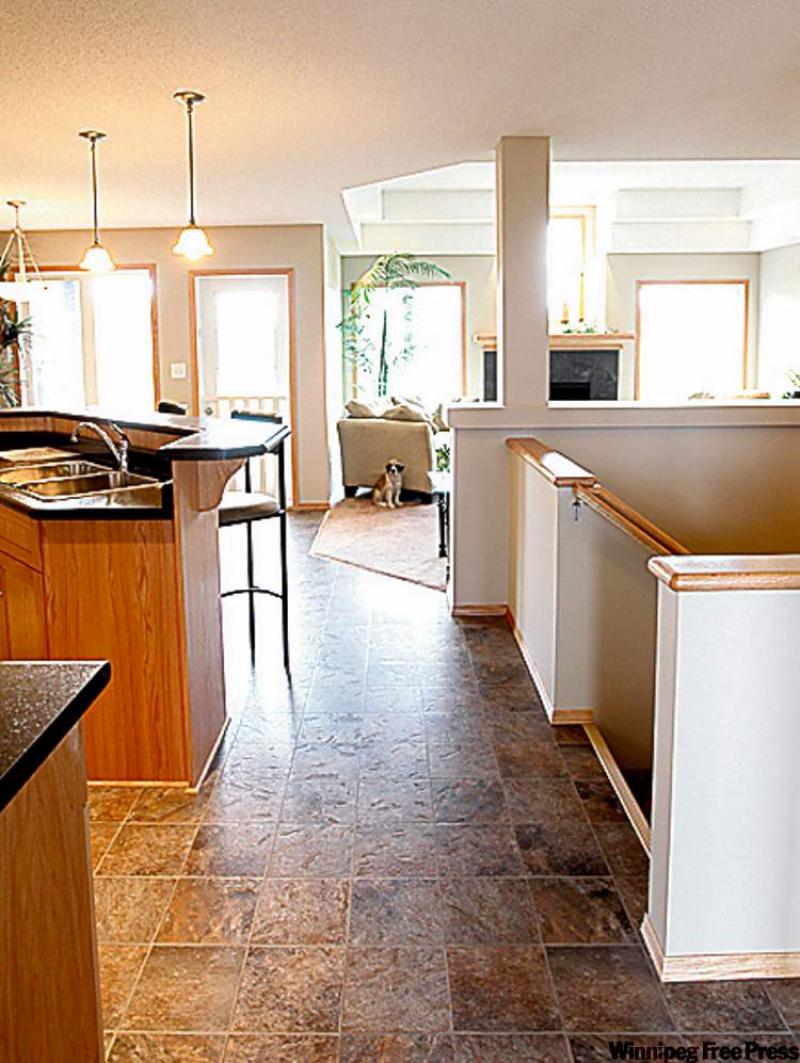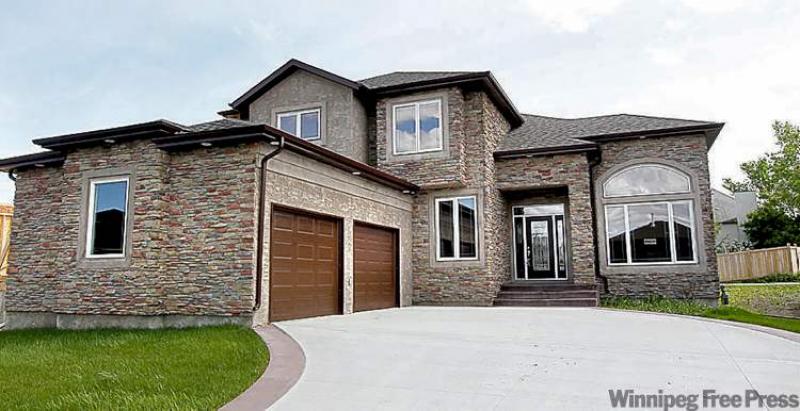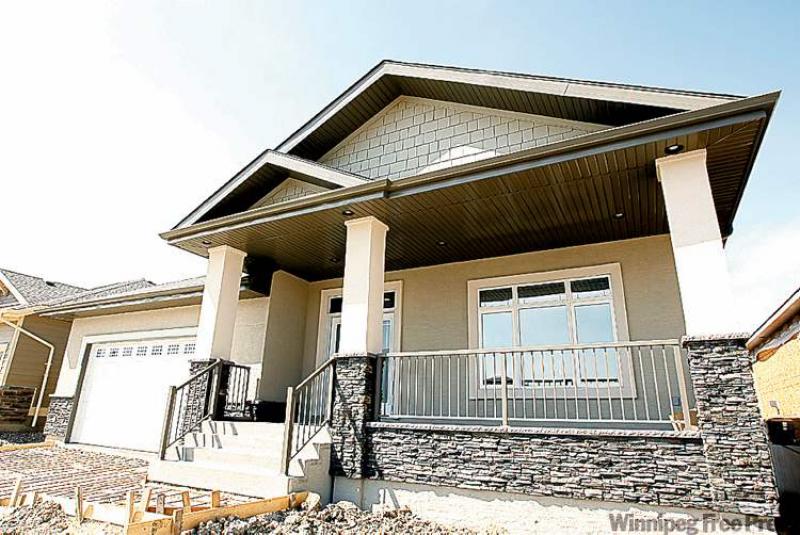New Homes
New Homes
Winnipeg's future discussed in documents
There has been considerable talk recently regarding the master plan draft on Winnipeg's future.
Originally launched as Speak Up Winnipeg, this was a comprehensive, exhaustive and inclusive process that sought the input of all of this city's citizens regarding future directions for the next 25 years. There were dozens of workshops involving thousands of people. The results are now available.
Our Winnipeg is a 110-page blueprint aimed at guiding the physical, social, economic and environmental development of our city. It delivers an introductory overview to the ensuing, more topic-direct documents while providing food for thought in areas such as safety, recreation and other qualities of life.
A Sustainable Winnipeg is 50 pages long and provides a directional strategy aimed at defining sustainability and then achieving it. It admits that significant change to our current way of thinking will need to be introduced, while stating that the basic principles of sustainability must be part of every decision going forward. It lays out some of these considerations while conceding that the tools will continue to evolve over time.
Sustainable Water and Waste is a 68-page document that deals with water, wastewater, stormwater and the Capital Region. Given the new water-treatment proceedings, concerns about what we are doing to our water systems and the amount of water that has fallen from the sky over the past three weeks, this is an extremely relevant subject. After all, the River City has a large reputation to maintain.
Sustainable Transportation is a 58-page document that addresses an extremely hot topic in Winnipeg. Last week, informational workshops were conducted on Transit Oriented Development. The need for efficient transportation systems being developed as the city grows and changes is critical if we are to thrive over the next 25 years and beyond.
Finally, Complete Communities is a 162-page document that concentrates on housing, commercial development, parks and open areas, rural and agricultural lands, aboriginal economic development areas, airport, heritage conservation and the urban and capital regions. This is about where we live and how we live.
Future Saturday columns will deal with these documents in greater depth.
Mike Moore is president of the Manitoba Home Builders' Association.
New Homes
Activity shows market has bounced back
Venture into any new subdivision and you will see a flurry of residential construction activity.
During the recent Spring Parade of Homes, Amber Trails, Algonquin Estates, Bridgwater Forest, Canterbury Park, Harbourview South, Heartstone Estates, Kildonan Green, Royalwood, Sage Creek, South Pointe and Van Hull Estates were not only highlighting completed show homes, but were also busy building more new homes.
New home construction was the beneficiary of an early weather break thanks to an unseasonably warm March. Although rain has recently slowed things down a bit, demand is still high in Winnipeg and Manitoba.
Residential building permits are considerably ahead of last year.
The first four months of 2009 found us still mired in a recession.
Still, this year's activity sends a positive message concerning confidence in the economy and the residential construction industry.
In Manitoba, residential permits are up 53.66 per cent over last year.
Single-family detached construction makes up 80 per cent of that market, although multi-family housing has more than doubled last year's pace.
In Winnipeg, multi-family permits represented 17 per cent of the market at this point last year. In 2010, that percentage has grown to almost 25 per cent, as this sector has experienced a rejuvenation of sorts. As a whole, residential permits are up 72.38 per cent over last year.
What does all this mean? In part, it signifies that we're back to business as usual. The builders and sub-trades are busy trying to fill the demands of the public. The consumer is confident of the economy and is moving ahead on plans that may have been shelved since mid-2008. We may not be back to the lofty heights experienced in 2007, but we are definitely back.
Manitoba is not the only province in Canada to be experiencing this rebound effect. However, we are one of the few bouncing back so quickly.
Residential construction permit activity may not stay at this rate of increase in Manitoba and Winnipeg all year, but the positive signs for the first four months bode well, once again proving now is an ideal time to purchase a new home.
Mike Moore is president of the Manitoba Home Builders' Association
New Homes
Renovation industry likely to remain strong
RESIDENTIAL renovation is a $54-billion business annually in Canada.
Manitoba and Winnipeg have long been reputed to be the renovation capitals of Canada. Even though we don't always follow national trends, we can always learn from them.
Even in the recessionary times of late 2008 and early 2009, renovation spending remained positive in Canada. Last year, home improvements and repairs increased .8 per cent across the country in a time where discretionary spending was being severely reduced. Much of the credit goes to the Home Renovation Tax Credit and the ecoEnergy retrofit grants from the federal government.
Now that both programs have ended, it will be interesting to see the impact on renovations this year. Although the HRTC did its intended job of stimulating the economy, it should have been extended in some form.
Winnipeg has the third-oldest housing stock in Canada and those houses will require renovations. Our boom in existing home sales also bodes well for the industry. Many households make repairs, as well as cosmetic changes prior to selling, in order to increase the attractiveness of the house.
There are, however, a few dark clouds on the horizon for the renovation industry. First and foremost is the impact of the Harmonized Sales Tax.
Ontario and B.C. are implementing the HST on July 1 of this year; Quebec and Nova Scotia are increasing their existing tax rates. Manitoba is currently HST free, so our homeowners seeking renovations will not be subject to that additional tax burden.
The projected increase in interest rates may have some effect on the industry, but it is not likely to be a large factor in Manitoba. Rates are still very low and consumers still see the wisdom in taking advantage of the opportunity to borrow in order to make home improvements.
Renovation spending is projected to be up 6.6 per cent across Canada this year, with comparable increases in Manitoba. That number will drop by 3.2 per cent in Canada while remaining about the same here in 2011.
By all accounts, the renovation industry is expected to remain very strong in Manitoba for the foreseeable future.
Mike Moore is president of the Manitoba Home Builders' Association.
New Homes
Good arguments for buying a new home
WITH all the financial issues in the U.S and Europe, there has been unfounded fear regarding the situation in Canada.
The European situation is definitely a crisis, but the impact on Canada is different than in the U.S. The Americans have a much deeper hole to climb out of, and every one of their trading partners makes that climb steeper. Given that Europe represents 12 per cent of the U.S. economy, the EU crisis hurts the U.S. recovery.
As we know, the U.S. housing crisis was caused by reckless lending practices. This hasn't happened in Canada and it won't. The Canadian banking system is still rated the best in the world.
The U.S. has entered into numerous spending and incentive programs and, although these may provide some stimulus for the economy, they will do nothing to help balance the budget. In Canada, we appear to have those factors under control. Although we bemoan the fact the government has halted the Home Renovation Tax Credit and the Eco Energy grants, what these may really mean is the government doesn't feel we need them anymore to bolster our economy.
Four out of 10 homeowners in Canada have more than 30-per-cent equity in their homes. That makes for a tremendous downpayment towards a new home. There is concern about rising interest rates, but many look at this increase incorrectly. We look at where interest rates were at their absolute lowest, at a time when the government was artificially keeping rates down to stimulate a weak economy.
This increase is simply a return to normalcy. Most Canadians lock into a five-year mortgage. So, don't look at interest rates from last year; look at them five years ago. That's the figure by which you will be comparing future mortgage payments to past payments. Using that logic, we see that even with projected hikes, interest rates will only be about .3 per cent higher than what you were previously paying. All in all, mortgage rates are and will continue to be extremely new-housing friendly.
All signs of the Canadian economy and, in particular, the Manitoba economy, point towards a perfect time to purchase a new home. Our hesitation in 2009 may have been based on sound cautionary measures, but now it's time to take the step we've been considering for the past few years.
New Homes
Little homework helps you choose right renovator
DECIDING who to hire for your home renovation is an important part of planning for the success of your project. You want to work with a professional contractor, someone who is reputable and in business for the long term.
You need to find someone who is right for your particular project and someone you can feel comfortable with and can develop a good working relationship with.
Not everyone who offers renovation services is in business legitimately.
Some are 'fly-by-nighters' --who are here today and gone tomorrow. Some are 'moonlighters -- they do renovation on the side but it's not their 'real job.' Others are 'low-ballers' who ask for cash payment and fly 'under the radar' by avoiding registration, taxes and other normal costs of doing business properly.
Any home renovation, no matter the size, is an investment in your home and your life. Look for a contractor who:
-- Offers proof of being in business: GST/business registration, workers compensation, insurance, and so on.
-- Works with a written contract.
-- Offers a warranty on their work.
-- Provides referrals to previous work and clients.
-- Is happy to talk about their company, their experience and their plans for the future
Companies that belong to RenoMark, a program for professional renovators in some areas of Canada, commit to a renovation-specific code of conduct.
Check www.homebuilders.mb.ca for more information and a listing of members in Manitoba.
You want to find someone who has experience with the kind of renovation you are planning and can add value to your project through their expertise.
As you search for renovators, ask friends, family and co-workers for recommendations for companies with proven experience; do a little independent research for companies that may be a good match for your project; and ask renovators directly about their experience and possible fit with your project.
Reputable, experienced renovators are often booked well in advance.
Start your search early on in your planning process and be prepared to wait, if possible. When you find the right renovator, a small delay is a reasonable price to pay for a renovation done right.
This backgrounder has been prepared by the Canadian Renovators' Council of the Canadian Home Builders' Association.
New Homes
Strengthening consumer protection properly
THE province recently announced it is introducing changes that will benefit consumers. Gord Mackintosh, minister responsible for consumer and corporate affairs, said the government is committed to strengthening consumer protection in 42 different areas.
Proposed changes include a variety of items of interest to current and potential home buyers and those wanting to upgrade their existing home. For example, legislation will be introduced to protect against real estate fraud occurring when properties are sold without proper authorization. The government will also provide assurances for home buyers regarding the condition of their intended home purchase. This may come in the form of inspections, although Manitoba does not currently license home inspectors, so this may be difficult to qualify. The provision of a statement of current property condition may be the first step in this discussion.
The Manitoba Home Builders' Association and the province have been engaging in discussions regarding new home warranties. The MHBA has long been in favour of mandatory warranties for new homes. The MHBA will not even accept members who have not offered third party warranties for at least two years.
The laborious part of these discussions has been the determination of what should and shouldn't be part of the mandatory new home warranty. After all, for every item included the cost to the consumer increases and neither the province nor the MHBA want to make housing affordability more difficult.
It will be important to find the right balance of necessary protection for the consumer without burdening them with unnecessary expenses for coverage they don't require.
The proposed new legislation also aims to ensure that consumers are dealt with fairly in home renovations. The initial intent is to develop legislation regarding contracts, estimates and final costs. Again, the MHBA is fully supportive of legislation that will force all persons doing renovations for consumers to adhere to the high standards set by the RenoMark renovator members of the MHBA.
The province and the consumer affairs branch have proposed some very ambitious goals for the future. However, by working closely with industry to ensure a win/win scenario for business and consumers, the odds of success are greatly enhanced.
Mike Moore is president of the Manitoba Home Builders' Association.





